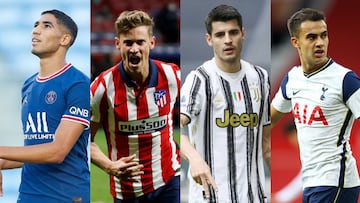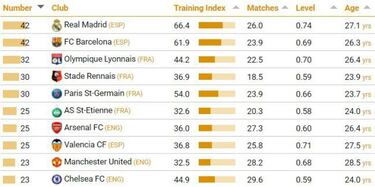Real Madrid is the seedbed of Europe's elite
According to a study conducted by CIES, the Spanish club currently has the most and best young players in the continent's five major leagues.

The Real Madrid factory continues to churn out talent. In fact, it is proving to have one of the most prolific youth academies in Europe according to recent data, although they’re now helping other clubs.
Real Madrid’s kids are alright
In the latest report by the International Centre for Sports Studies (CIES), of the continent’s five major leagues, Los Blancos’ youth academy comes out top. With a total of 42, they are only matched, curiously, by eternal rivals Barcelona, however, there is a difference between the two.
You may also enjoy:
- Barça set to appoint Xavi as new head coach: latest news
- Haaland not expected to return to action until 2022
- Real Madrid enter the race for Salzburg star Adeyemi
- Torres: Salah is the best in the world
- Espanyol and Madrid stars, most popular LaLiga players in La Palma shirt auction
The data boffins have created a measure called a ‘training index’ with which they try to assess, among other things, the importance and presence of these players. As CIES explain:
The Training Index is “an indicator weighting the number of players trained according to the sporting level of their employer clubs (through a coefficient based on domestic league and international club competitions results), their employment rate (over the last year), as well as their age (the younger, the better).”
Based on this index, Real Madrid's training index is 66.4, while the Blaugrana's is 61.9. Taking all leagues into account, it’s the perennial Ajax that come out on top, nurturing a total of 81 currently active players and with a Training Index value of 102.3. They are followed by Sporting CP (91.8) before Madrid and then Dinamo Zagreb and Benfica ahead of Barça.

The average age of Madrid's youth players in the five major leagues is 27, and they play an average of 26 games per season. In addition, the level of the clubs they play at is generally high. According to CIES, it sits at a score of 0.74, second only to Atlético Madrid (0.79), although the Rojiblancos only have 20 players in the elite of European football. Note that, according to UEFA, a youth product is considered to be any player who spent at least three seasons between the age of 15 and 21.
Youth academies as a business
In addition to being a breeding ground for the first team, Madrid has turned its youth academy into one of its main economic assets. In recent seasons, it has been one of the most lucrative business channels for the club, which has survived the economic crisis caused by the pandemic partly because it has provided an outlet for some of these youth players. With such impressive, high-tech plans progressing on the new Santiago Bernabéu stadium, this has been worthwhile.

The most obvious case to point to is that of Álvaro Morata. After leaving the youth academy and spending a season at Juventus, he returned to the Spanish capital to try to succeed a second time. He did to some degree but failed to guarantee himself a starting place so found an escape to Chelsea for 80 million euros. Similar situations were experienced by Llorente (he went to Atlético for €40m), Reguilón (to Tottenham for €30m) and Achraf (to Inter for €40m).
Real Madrid: youth product sales
| Player | Year sold | Price (€ million) | Club |
| Morata | 2017 | 80 | Chelsea |
| Diego Llorente | 2017 | 11 | Real Sociedad |
| Mariano | 2017 | 8 | Lyon |
| Burgui | 2017 | 3 | Alavés |
| Mascarell | 2018 | 10 | Schalke |
| Lucas Torró | 2018 | 3.5 | Eintracht |
| Lienhart | 2018 | 2 | Friburg |
| Marcos Llorente | 2019 | 40 | Atlético Madrid |
| Raúl de Tomás | 2019 | 20 | Benfica |
| Achraf | 2020 | 40 | Inter |
| Reguilón | 2020 | 30 | Tottenham |
| Óscar Rodríguez | 2020 | 13.5 | Sevilla |
| Javi Sánchez | 2020 | 3 | Valladolid |
| Dani Gómez | 2020 | 2 | Levante |
| Odegaard | 2021 | 35 | Arsenal |
Related stories

Real Madrid: Bale set to return with Hazard in exile under Ancelotti

Clattenburg on 2016 Real Madrid-Atletico final: Ramos was offside and Torres penalty was 50-50
Since 2017, Madrid has taken €301 million in sales of their young talent, not including any benefits of the loan scheme. This has given a relative respite to the club's finances when it has needed it most, and proved to be an enviable position when compared to the troubles of others over the last two years.
Of those that stayed, many have proven themselves as key players or as promising stars of the future. Carvajal, Lucas Vázquez, Nacho, Valverde and Mariano have all featured to varying degrees in the first team. In addition, Miguel Gutiérrez, Antonio Blanco and Sergio Arribas are very involved in the dynamics of the first team, and it is expected that next year they could have a more influential role to play.